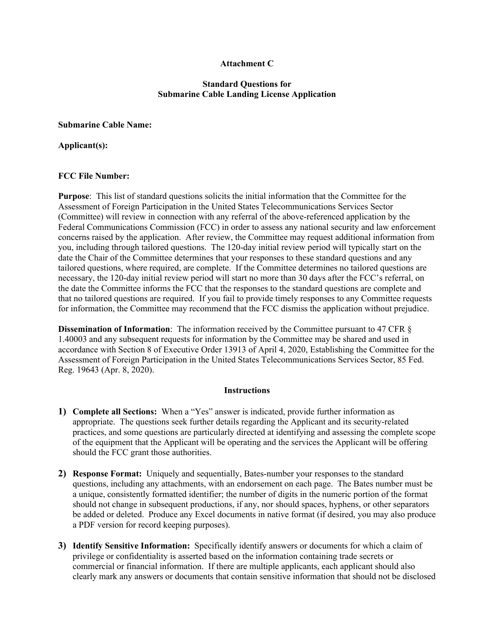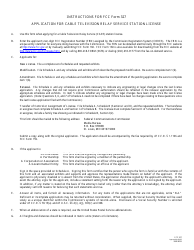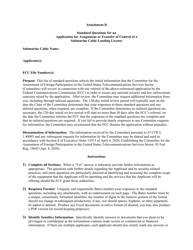Attachment C Standard Questions for Submarine Cable Landing License Application
What Is Attachment C?
This is a legal form that was released by the Federal Communications Commission and used country-wide. As of today, no separate filing guidelines for the form are provided by the issuing department.
FAQ
Q: What is a submarine cable landing license?
A: A submarine cable landing license is a permit that allows the installation and operation of a submarine cable landing station in a specific location.
Q: Who issues submarine cable landing licenses?
A: In the United States, submarine cable landing licenses are issued by the Federal Communications Commission (FCC).
Q: What is a submarine cable landing station?
A: A submarine cable landing station is a facility where submarine cables are connected to land-based telecommunication networks.
Q: Why is a submarine cable landing license required?
A: A submarine cable landing license is required to ensure proper regulation and oversight of international submarine cable systems to protect national security, public safety, and the environment.
Q: What is the application process for a submarine cable landing license?
A: The application process for a submarine cable landing license involves submitting an application to the FCC, providing detailed information about the cable system, its route, landing points, and operational plans.
Q: What factors are considered when reviewing a submarine cable landing license application?
A: When reviewing a submarine cable landing license application, factors such as national security, environmental impact, technical feasibility, and compliance with regulations are considered.
Q: How long does it take to obtain a submarine cable landing license?
A: The time it takes to obtain a submarine cable landing license can vary, but the FCC aims to process applications within 120 days of receiving a complete application.
Q: Are there any fees associated with a submarine cable landing license?
A: Yes, there are fees associated with obtaining a submarine cable landing license. The exact fees depend on various factors, such as the length of the cable and the number of landing points.
Q: Can a submarine cable landing license be transferred or assigned to another party?
A: Yes, a submarine cable landing license can be transferred or assigned to another party, but prior approval from the FCC is required.
Q: What happens if a submarine cable landing license is not obtained?
A: If a submarine cable landing license is not obtained, the installation and operation of a submarine cable landing station would be considered illegal and subject to penalties.
Form Details:
- The latest available edition released by the Federal Communications Commission;
- Easy to use and ready to print;
- Yours to fill out and keep for your records;
- Compatible with most PDF-viewing applications;
- Fill out the form in our online filing application.
Download a printable version of Attachment C by clicking the link below or browse more documents and templates provided by the Federal Communications Commission.




























